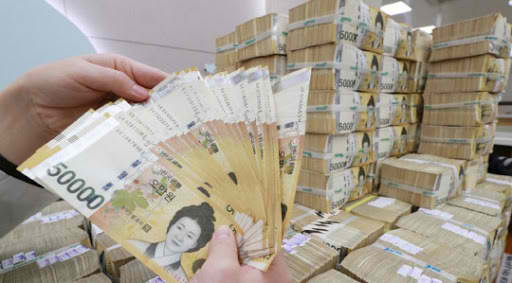SEOUL — South Korea’s volume of short-term floating capital — so-called “idle funds” — surpassed 1,100 trillion won ($901 billion), hitting a record-high amid the prolonged COVID-19 crisis and the continued low rate trend, data showed Sunday.
The volume of cash, demand deposits, money market funds and other types classified as idle funds reached 1,106.3 trillion won as of end-March, up by around 10 trillion won on-month, according to data compiled by the Bank of Korea and the Korea Financial Investment Association.
The on-month increase peaked at 47 trillion won in February –- when the coronavirus cases spiked here — marking the steepest growth since KOFIA started compiling the data in 2006.
Local investors have been mulling their next steps in investments as lower interest rates have also been dragging down returns on savings. The average return rate based on the combined outstanding deposits of Korean banks dropped to 1.57 percent in April from 2.02 percent in March.
Responding to the ongoing epidemic crisis and sluggish economy, the BOK slashed the base interest rate to a fresh record-low of 0.5 percent on Thursday –- the lowest since it adopted the current system in 1999. The latest action followed an earlier “big cut” in March, when the central bank reduced the policy rate by an unprecedented 0.5 percentage point to 0.75 percent.
Experts project the money to flow into the stock market, with the government’s tightened real estate regulations fending off new investments.
In a bid to cool off the heated local real estate market, the Moon Jae-in administration has been implementing a series of rigid measures related to taxes and loans.
“Due to the tightened real estate measures, which will eventually lead to higher property taxes, the money is likely to flow into the stock market,” said Hwang Se-woon, a senior researcher at Korea Capital Market Institute.
The benchmark Kospi also recovered above the 2,000 point-level for the first time in nearly three months last week, luring investors. It ended at 2,029.6 on Friday.
The amount of stock investment deposit — investors’ cash entrusted to brokerages, mostly for future stock investment — grew by 63.1 percent from end-2019 to 44.5 trillion won, as of Friday.
“There is a high possibility that lower interest rates would pressure investors to relocate their idle funds,” Hwang added, explaining that usually idle funds under low interest rates flow into the housing sector or stock markets.
